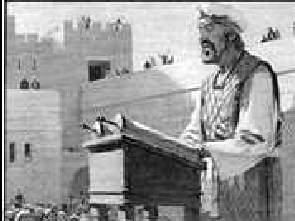A Journey through the Bible with Tiglath
76. Nehemiah, Chapter 6 to end of book
We have already seen that Nehemiah had enemies when he attempted to
rebuild the walls of Jerusalem. They try to stop the work but chapter 6 informs us
that the wall is completed. It is worth reading chapter 6 to learn about the
plotting. Chapter 7 contains a list of all the Jews who came first out of
Babylon when the exile began. There is also a register of those who returned to
their own land at the end of the exile. Upon studying the chapter you will
realise the great detail the writer has included, not only listing the names of
people but also the number of animals, the amount of gold and even the
number of priestly garments.
Ezra at the Water Gate
Chapter 8 begins by telling us that all
the people gathered in the street by the
Water Gate. Here, Ezra the scribe reads
the book of the law of Moses. The aim of
this meeting is to strengthen the religious
side of the life of the people. In other
words, to bring back those that had
strayed from the true worship of God. The
meeting ended with a great feast that
lasted several days.
Chapter 9 shows a change of mood while still keeping
the religious theme. On the 24th day of the month the people gathered together.
They fasted and put on sack cloth and earth — then confessed their sins. The
Levites stood before the people and recounted the history of the Jews from the
time of Abraham. (if you read from v 6 it gives you a good revision of the
Jewish people.) The Levites make a solemn covenant with God.
Chapter 10 tells us the names of those that sealed the covenant; also that all the people swore to observe it. The rest of the chapter outlines the articles of the covenant. Not everybody who returned from Babylon settled down in Jerusalem.
Chapter 11 tells us the names of those who did. These were the rulers, voluntary men and every 10th man chosen by lot. The residue of the people settled in other cities.
Chapter 12 begins with a list of names of priests and Levites who settled in
Jerusalem and tells of the rejoicing when the walls of Jerusalem were dedicated
to God. In the last chapter we find Nehemiah reforming the way in which the
Temple is organised. He has the Temple cleaned and treasurers are appointed.
He made sure that the Sabbath day was kept properly (v. 15 -21). The book ends
with the condemnation of those Jews who took foreign wives.
